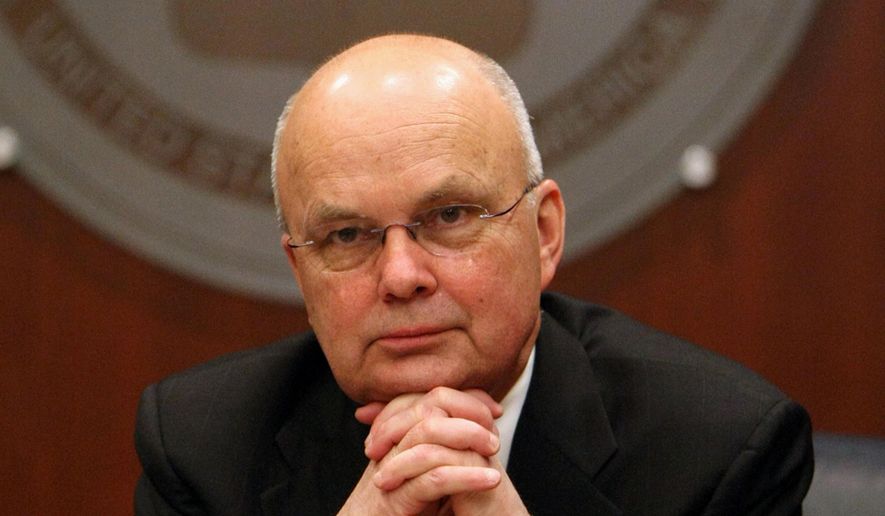In the wake of Senate Democrats’ releasing their report on the CIA’s post-9/11 interrogation program, former CIA directors and officials are blasting the report as essentially a partisan attack on the agency.
“The committee has given us … a one-sided study marred by errors of fact and interpretation — essentially a poorly done and partisan attack on the agency that has done the most to protect America after the 9/11 attacks,” the officials wrote in the Wall Street Journal.
The piece was authored by former CIA Directors George J. Tenet, Porter J. Goss and Michael V. Hayden and former CIA Deputy Directors John E. McLaughlin, Albert M. Calland and Stephen R. Kappes.
The officials write that while the agency did not do everything perfectly, they reported things that should not have happened under the program to the CIA inspector general or Justice Department and sought to take corrective action.
The release on Tuesday of the roughly 500-page executive summary of the classified 6,000-page committee report is seen as the most comprehensive public accounting to date of the agency’s handling of terrorists post-9/11. The report said the agency lied about the program’s scope, and it also included details on interrogation techniques used on terrorist suspects like death threats, waterboarding, and rectal force-feeding.
Contrary to the report, which says the interrogation techniques critics label “torture” were not effective in securing valuable intelligence information, the officials wrote that the program led to the capture of senior al Qaeda operatives, led to the disruption of terrorist plots and added to the organization’s intelligence about the terrorist group.
They said they’re convinced that senior al Qaeda operative Abu Zubaydah and 9/11 mastermind Khalid Sheikh Muhammed would not have talked absent the interrogation program.
“Once they had become compliant due to the interrogation program, both Abu Zubaydah and KSM turned out to be invaluable sources on the al Qaeda organization,” they wrote.
They also wrote that there is “no doubt” the information provided by the “totality” of detainees in CIA custody, including those subject to interrogation and those who were not, were essential to bringing Obama bin Laden to justice, notably information developed in the program that “piqued the CIA’s interest” in bin Laden’s personal courier.
The officials also cite a prosecutor’s report, developed at the behest of Attorney General Eric H. Holder Jr., that determined “no prosecutable offenses were committed” under the program and say the argument that the CIA misled Congress, the White House, and others about the program is “flat-out wrong.”
In a post-9/11 atmosphere, they said, it felt like a “ticking time bomb” scenario every single day.
“The Senate committee’s report says that the CIA at that point had little experience or expertise in capture, detention or interrogation of terrorists. We agree,” they wrote. “But we were charged by the president with doing these things in emergency circumstances - at a time when there was no respite from threat and no luxury of time to act. Our hope is that no one ever has to face such circumstances again.”
They also wrote there was “extensive consultation” with the national security adviser, deputy national security adviser, White House counsel, and the Justice Department.
“The CIA reported any allegations of abuse to the Senate-confirmed inspector general and the Justice Department,” they wrote. “CIA senior leadership forwarded nearly 20 cases to the Justice Department, and career Justice officials decided that only one of these cases — unrelated to the formal interrogation program — merited prosecution. That person received a prison term.”
They also wrote that they briefed Congress about 30 times and said committee staff avoided interviewing anyone who had been involved in establishing or running the program.
“The excuse given by majority senators is that CIA officers were under investigation by the Justice Department and therefore could not be made available. This is nonsense,” they wrote. “The investigations referred to were completed in 2011 and 2012 and applied only to certain officers.”
Consequences of the report, they wrote, are that many CIA officers will be concerned that being involved in “legally approved sensitive actions” can open them up to scrutiny and censure, less cooperation from foreign partners, and terrorists’ using it as another recruitment tool.
• David Sherfinski can be reached at dsherfinski@washingtontimes.com.




Please read our comment policy before commenting.